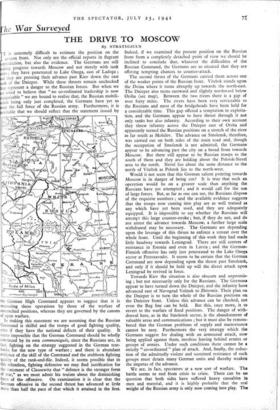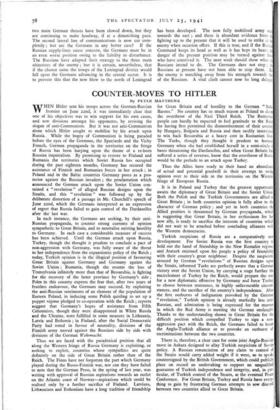hc War Su rveyed
THE DRIVE TO MOSCOW
By STRATEG ICUS
T is extremely difficult to estimate the position on the eastern front. Not only are the official reports in flagrant ntradiction, but also the evidence. The Germans are still king progress towards Moscow and not merely with tank ts ; they have penetrated to Lake Onega, east of Ladoga ; d they are pressing their advance past Kiev down the east of the Dnieper. While these thrusts remain unchecked ev represent a danger to the Russian forces. But when we c asked to believe that "no co-ordinated leadership is now cognisable" we are bound to realise that, the Russian mobili- tion being only just completed, the Germans have yet to eet the full force of the Russian army. Furthermore, it is evitable that we should reflect that the statement issued by the German High Command appears to suggest that it is measuring these operations by those of the warfare of entrenched positions, whereas they are governed by the canons of open warfare.
In making this statement we are assuming that the Russian Command is skilful and the troops of good fighting quality, even if they have the national defects of their quality. It seems impossible that the German Command should be wholly convinced by its own communiqués, since the Russians are, in fact, fighting on the strategy suggested in the German text- books for the new type of warfare ; and there is abundant evidence of the skill of the Command and the stubborn fighting quality of the rank-and-file. Indeed, it seems possible that in this relentless, fighting defensive we may find justification for the statement of Clausewitz that "defence is the stronger form Df war," as we must admit his truism about the diminishing force of the offensive. On examination it is clear that the German offensive in the second thrust has advanced at little more than half the pace of that which it attained in the first Indeed, if we examined the present position on the Russian front from a completely detached point of view we should be inclined to conclude that, whatever the difficulties of the Russian Command, the Germans are so situated that they are offering tempting chances to counter-attack.
The second thrust of the Germans carried them across one of the weaker points of the Russian front. Vitebsk stands upon the Dvina where it turns abruptly up towards the north-east. The Dnieper also turns eastward and slightly northward below Orsha (see map). Between the two rivers there is a gap of over forty miles. The rivers have been very serviceable to the Russians and most of the bridgeheads have been held for a considerable time. This gap offered a temptation to exploita- tion, and the Germans appear to have thrust through it not only tanks but also infantry. According to their own account they threw infantry across the Dnieper east of Orsha and apparently turned the Russian positions on a stretch of the river as far south as Mohilev. The advance on Smolensk, therefore, was carried out on both sides of the main road and, though the occupation of Smolensk is not admitted, the Germans appear to be advancing past the city on a broad front towards Moscow. But there still appear to be Russian troops to the south of them and they are holding about the Polotsk-Nevel area to the north. Nevel lies about the same distance to the north of Vitebsk as Polotsk lies to the north-west.
Would it not seem that this German salient pointing towards Moscow is in danger of being cut? It is true that such an operation would be on a greater scale than anything the Russians have yet attempted ; and it would call for the use of large forces. But, as far as one can see, the Russians dispose of the requisite numbers ; and the available evidence suggests that the troops now coming into play are as well trained as any which have yet been used, and they are adequately equipped. It is impossible to say whether the Russians will attempt • this large counter-stroke ; but, if they do not, and do not arrest the advance towards Moscow, a further large scale withdrawal may be necessary. The Germans are depending upon the leverage of this thrust to enforce a retreat over the whole front. Until the beginning of this week they had made little headway towards Leningrad. There are still centres of resistance in Estonia and even in Latvia ; and the German- Finnish offensive has only just penetrated to the Lake Onega sector at Petrozavodst. It seems to be certain that the German Command are now depending upon the thrust past Smolensk, and only if it should be held up will the direct attack upon Leningrad be revived in force.
Towards Kiev the situation is also obscure and unpromis- ing; but not necessarily only for the Russians. The Germans appear to have turned down the Dnieper, and the infantry have advanced east of Novograd Volinsk to Zhitomir. Their plan on the Dnieper is to turn the whole of the Russian positions on the Dniester front. Unless this advance can be checked, not even the Bug line can be held. But this, once more, is to revert to the warfare of fixed positions. The danger of with- drawal here, as in the Smolensk sector, is the abandonment of valuable areas and communications ; but it must also be remem- bered that the German problems of supply and maintenance cannot be easy. Furthermore the very strategy which the Germans suggest for dealing with an armoured attack, now being applied against them, involves leaving behind armies or groups of armies. Under such conditions there cannot be a strictly " co-ordinated " plan of attack. And, finally, the reduc- tion of the admittedly violent and sustained resistance of such groups must detain many German units and thereby weaken the impetus of the advance.
We are, in fact, spectators at a new sort of warfare. The battle seems to reel from crisis to crisis. There can be no question that both sides have suffered heavy casualties in men and material, and it is highly probable that the real weight of the Russian army is only now coming into play. Tho two main German thrusts have been slowed down, but they are continuing to make headway, if at a diminishing pace. The second lateral line of communications is now cut com- pletely; but are the Germans in any better case? If the Russian supply-lines cause concern, the Germans must be in an even worse position owing to the liability to disturbance. The Russians have adapted their strategy to the three main objectives of the enemy ; but it is certain, nevertheless, that if the chance came the troops of the Leningrad district would fall upon the Germans advancing in the central sector. It is to prevent this that the new blow to the north of Leningrad has been developed. The now fully mobilised army m, towards the east ; and there is abundant evidence from fighting up to the present that it will be used to strike at enemy when occasion offers. If this is true, and if the Russ Command keeps its head as well as it has kept its heart, danger of the present position may be turned against th who have contrived it. The next week should show what Russians intend to do. The Germans dare not stop ; tie Russians at present have not been able to stop them. the enemy is marching away from his strength towards t of the Russians. A vital clash cannot now be long delay



























 Previous page
Previous page